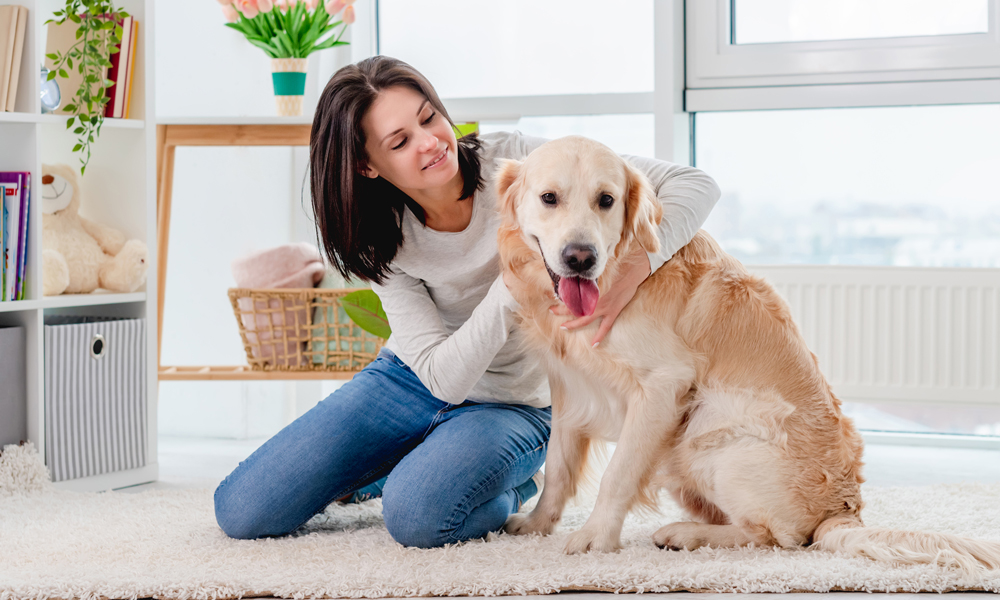There are few things more exciting or heartwarming than bringing a rescue dog home to live with you. But for some dogs, especially adult dogs, the transition from shelter to family home can be difficult. So, what can you do to make the change a little easier? Here are some common questions and tips about helping a rescue dog adjust to a new home.
Where should a rescue dog sleep the first night?
Many new owners wonder where their rescue dog should sleep on that first night at home. Most vets recommend using a crate because it not only replicates a cozy dog den, it also helps keep them safe. Some owners keep the crate in their bedroom for the first few nights because being in the same space allows you to help the dog feel safer and rest easier.
How long does it take for a rescue dog to adjust to a new home?
Every dog is different and how their transition progresses has a lot to do with their previous circumstances. If they were at a particular rescue or shelter for an extended period of time, they may have bonded with the staff. Being away from those relationships can cause separation anxiety, which can lead to a range of different behaviors. Likewise, if they have moved between shelters frequently, they may take longer to develop strong bonds with your family. Be patient with your new pup and use the 3-3-3 rule as a general guide for transition milestones.
What is the 3-3-3 rule for rescue dogs?
The 3-3-3 rule refers to the amount of time it can take for rescue dogs to feel comfortable in a new home and breaks it down into milestones: three days, three weeks, and three months.
- 3 Days – During the first few days in a new home, rescue dogs are often overwhelmed by the change and may be skittish or unengaged because they are uncomfortable. Some dogs will avoid food and water, and testing boundaries is common as they work to understand what is expected of them in their new life.
- 3 Weeks – At this point, many dogs are starting to settle in, and you’ll likely notice more of their true personality as they start to open up and get more comfortable. This is also when dogs will start getting into a routine and can be the time when behavior issues become more pronounced.
- 3 Months – By the three-month mark, most dogs are comfortable in their new homes because they have established trust with their adopted family. This is when dogs often become fully “settled in” to their new life.
How can I help my rescue dog adjust to a new home?
There are some general things you can do to make your home more welcoming to a new rescue dog. Here are a few simple “dos and don’ts” to help ease the transition:
- Tour the house and outdoor areas – When bringing your rescue dog home for the very first time, give them a quick tour of all the indoor and outdoor spaces. This will eliminate some unknowns and help them feel more comfortable in your home.
- Give them their own space – Whether it’s a crate, a carrier, or just a dog bed and maybe a cozy blanket, it’s important to give dogs a space where they can feel safe and secure. Dogs naturally seek out sheltered dens, so creating that kind of comforting space can be a big help in easing a dog’s anxiety.
- Don’t introduce too many people right away – Everyone in your family will likely be excited to meet the new addition. But meeting too many people too quickly can be overwhelming for rescue dogs transitioning to a new home. Take it slow and give them a chance to adjust to all their new family members.
- Establish a routine – Establishing a daily routine can be comforting to dogs because it creates order in their lives, just as it does for humans. By having a set schedule for mealtime and other activities, you can help the dog feel calmer and safer in their new space.
How can I give my rescue dog the best start in their new life?
Every new dog owner wants the best for their furry friends. So, why not give them the best possible nutrition with Good 4 Life-supplemented pet foods from NutriSource. This proprietary line of gut health–boosting supplements can also have positive effects on your pets’ brain health, coat, and skin. Good 4 Life is found across the entire NutriSource line to help all pets live their healthiest lives.
Shop local and buy NutriSource from an independent pet supplier in your community.


